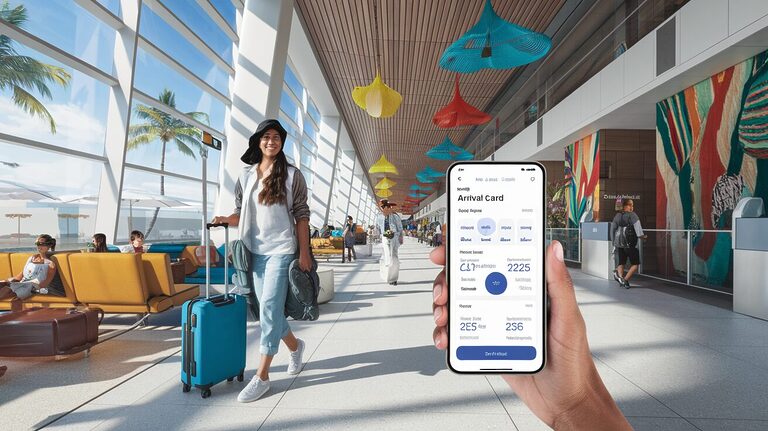As of July 1, a significant change in entry requirements for visitors to Cuba will take effect, requiring travelers to carefully consider their options. The traditional physical tourist card will be phased out and replaced by a new electronic visa (e-visa), mandating all tourists to secure this e-visa before their arrival. This modernization effort initiated by the Cuban Ministry of Tourism aims to streamline the travel process, enhancing both efficiency and security. With options available for both the e-visa and the existing tourist card until the end of 2025, it’s crucial for prospective tourists to understand the implications of these changes when planning their trips to this vibrant island.
As of July 1, the new travel regulations for Cuba introduce an electronic visa system, replacing the traditional tourist card. This modification aims to streamline the entry process for tourists while enhancing security and compliance with international practices. This article provides an overview of the new e-visa requirements, the validity of current tourist cards, and the necessary procedures to enter Cuba successfully.
The Transition to an Electronic Visa
The Cuban Ministry of Tourism (MINTUR) has confirmed that starting July 1, all tourists must acquire an electronic visa through the official platform evisacuba.cu. This new system supplanting the old physical tourist cards signifies a step towards modernization in Cuba’s immigration services. The traditional paper tourist cards will no longer be issued, ensuring that all travelers transition to the e-visa format.
Validity of Existing Tourist Cards
Travelers who have already obtained a physical tourist card will be pleased to know that these cards will remain valid until December 31, 2025, as confirmed by MINTUR. This policy allows those who possess existing cards to travel to Cuba without immediate concern for the new regulations. However, it’s essential for future travel plans to consider the transition to the e-visa system for entry beyond this expiration date.
Requirements for the Electronic Visa
The new electronic visa allows for a single entry into Cuba with a maximum stay of 90 days, with the possibility to request an extension. Additionally, before departure, every traveler is obligated to fill out a mandatory form on the dviajeros.mitrans.gob.cu website, which is a critical step in the entry process.
Completion of the Application Process
Applying for the electronic visa involves a straightforward online procedure designed to expedite the process. The application requires the submission of personal details and specific documentation. Payment for the e-visa, which is set at €22, must be made to the nearest consulate or embassy, with payment options varying by location. Once the application is submitted, applicants should expect a response within 72 hours.
Entry by Sea: Additional Requirements
For those planning to enter Cuba via maritime routes, it is necessary to contact a consular office directly. Increased regulations and tailored requirements may apply for sea entries, emphasizing the need to ensure all documents, including the electronic visa, are correctly processed before departure.
Modernizing Cuba’s Entry Procedures
This substantial shift towards an electronic visa system exemplifies Cuba’s commitment to modernizing its entry protocols and aligning with global practices in migration digitization. By using technology to enhance accessibility and efficiency, Cuba is ensuring a smoother travel experience for international visitors.
Related Information and Further Reading
Travelers interested in other essential information about visa applications may refer to the updates on related topics, such as how to time your e-visa applications for India, or exciting news on reduced fees for Cambodian e-visas. Keeping informed about the legalities and updates ensures a hassle-free journey.
- Electronic Visa (e-Visa)
- Available via evisacuba.cu
- Mandatory for tourists from July 1
- Single entry authorization
- Stay up to 90 days with extension option
- Application fee of €22
- Response within 72 hours
- Available via evisacuba.cu
- Mandatory for tourists from July 1
- Single entry authorization
- Stay up to 90 days with extension option
- Application fee of €22
- Response within 72 hours
- Tourist Card
- No longer issued after July 1
- Previously issued cards valid until December 31, 2025
- Does not allow for e-Visa benefits
- Will not accommodate new digital processes
- Requires mandatory form completion on dviajeros.mitrans.gob.cu
- Card holders need to transition to e-Visa
- No longer issued after July 1
- Previously issued cards valid until December 31, 2025
- Does not allow for e-Visa benefits
- Will not accommodate new digital processes
- Requires mandatory form completion on dviajeros.mitrans.gob.cu
- Card holders need to transition to e-Visa
Planning a Trip to Cuba Starting July 1
Starting on July 1, travelers to Cuba must obtain an electronic visa (e-visa) as the traditional physical tourist card will no longer be issued. This new mandatory e-visa, available on the official platform, allows for a single entry into Cuban territory with a stay of up to 90 days and the possibility of an extension. Current tourist cards will remain valid until December 31, 2025. Travelers must also complete a mandatory form before departure.

Hello! I’m Elisa, a 45-year-old travel companion with a passion for exploring new places and cultures. With years of travel experience under my belt, I thrive on creating memorable journeys for my clients. Let’s embark on an adventure together!





